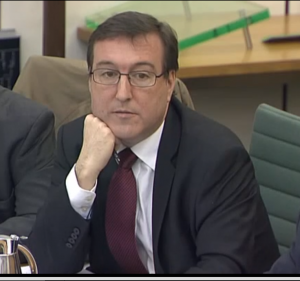CHRIS MATHESON: “THEY ARE PASSING AROUND THE RESPONSABILITY LIKE A HOT POTATO”
Chris Matheson* (MP of Chester) is member of the Culture, Media and Sport Committee that has secured a debate taking place on Thursday 9 February on the football governance in the House of Commons. The debate is on this motion: “That this House has no confidence in the ability of the Football Association (FA) to comply fully with its duties as a governing body”.
Chris Matheson talks about the Culture, Media and Sport Committee inquiry into major failings of football governance in the UK and the need for reforms
Why The Culture, Media and Sport Committee has secured on Thursday 9 February a debate on the governance of football and calls on the Government to bring forward legislative proposals ?
We receive every year the FA chiefs and the sports minister for an annual session. The current session on this matter began last october. The Culture, Media and Sport Committee has repeatedly urged the football authorities to improve self-governance. We received a letter from several previous FA secretaries and chairmen. They told us that they have made every effort to make changes on governance. This was not possible because of the structures.
At the same time we had a new minister of sports, Tracey Crouch and she came along with a new blue print, a new strategy for sport governement: to make it more modern, certainly more inclusive and it motived us. The FA was one of the most, one of the sport which was the most distant from the government vision and it looks like it’s gonna be the most difficult.
But also football is the most popular sport. Footall has to be the leader. And the other sports looks at football. When we received the letter from the formers bosses, it became clear that it was a problem, so we decided to look specifically at football

Chris Matheson, MP of Chester
Were you surprised when Greg Clarke, the FA chairman, told you during his hearing that he never knows about Vibrac, the offshore fund lender to several english clubs ?
No, I was not surprised. First of all he came from the Football League and Vibrac was more involved in Premier League clubs. Secondly I was disappointed when he tented to pass the responsibility around saying that’s the responsibility of Premier League.
That’s the responsibility of Football League, of Football Association. They are passing around the responsability like a hot potato. They need to have more clear level on their responsibility. They must ask who is responsible for the ownerships of clubs. Ask who is responsable for deciding which kind of investment is acceptable. Ask a clear responsibility for establishing and publishing the name of the beneficial owners of these funds.
There was also the growth of offshore financing. It’s a huge amount of money, particulary in the Premier League and it’s not clear where all of that goes.
How do you assess the English football level of regulation ?
It’s not sufficient, thinking about some clubs for example Coventry City at the moment or Blackpool where the ownership is clearly deficient, the supporters having a terrible time. The fans are the persons on the bottom of the pile, sport is at the bottom of the pile. I used to go at Chester City when I was a child, not often, sometimes. The old Chester City had financial difficulties and was boarded by people not suitable. When Chester City collapses, the fans came together to make a community on club (The new club Chester FC was founded in 2010 by the supporters that own it). I get the impression that the money talks more. It has to be much toughest test on ownership, on being a fit and proper person.
Do you feel by the supporters a request of better governance and regulation ?
Some supporters just want to go to the match with no trust in the government and politics. But certainly after the Allardyce affair I think a lot of people were asking how can that goes badly wrong.
Yes I think it was a growing expectation amongst a large section of supporters. Not all, but a large section asking for change to happen in the government of football. There was several factors that came together.
It seems that the Culture, Media and Sport Committee works on transpartisan way. Damian Collins (Chair) is conservative, you are a labour MP but you are on the same wavelenght ?
Obviously we are in different political party. But we work together at the Committee. Damian has a very good understanding of global sports politics and global sport governance. At the Committee we have several inquiries on this matter. We had an inquiry on sport government, FIFA for example, who under Sepp Blatter was failing very badly.
We looked at doping in sport and seen how the government of IAAF was failing. It is clear that one of the major problems is sport governance at international level and also this have an impact to domestic organisations which is our focus.
What do you think of the globalization in football, especially in England ?
My two football clubs are still local: Everton has the highest percentage of fans who walk to the game of any premier league club. Chester FC is owned by the fans.

Chris Matheson (right) with the Chester FC players
But you do see more youngsters wearing replica shirts of say, Barcelona or Real; that’s one thing, but when the financing becomes global there is a problem. There are billions going into the English Premier League, much of this going to players’ wages of course, but also much of is sloshing about into offshore accounts. Globalisation is one thing, but globalisation mixed with obscure money is a problem – because it is always the fans that end up paying the bill.
There is also a cultural problem that people don’t always support their home team any more. So the local allegiances are not as strong. I heard a Liverpool fan on the radio on Saturday saying that the reason Liverpool have declined in recent weeks is that they have no local Liverpool lads in their team. I don’t know if that is true but there has to be path through to the top for young players to make the break through. Of course because instant success is demanded now and the stakes are so high, it is much harder because clubs tend to want to buy in proven talent – and there is always a premium on young English players.
Except the main problem, the financial and property opacity, there is the cost for supporters. It’s expensive to go to the match, particulary if you going with the family. It’s expensive to buy suscriptions to watch Skysports. We know that a lot of that money for example is going into offshore companies offshore accounts of people already very rich.
Because the grassroots sport, grassroots game is not getting nearly as much money as they should, nearly much support from the professional game. There is a huge disparity of wealth beetween the Premier League clubs and those lower down the football pyramide, for example Chester.
What are the effects of globalization on the national team ?
Greg Clark the new chairman of the FA talks about only 30 % of Premier League stars now being english. There is a true contradiction between wanting at the same time Premier League and a national team both competitive.
I think back to when France won the World Cup in 1998. Yes it was a golden generation but it was also the consequence of the strategy in french football to develop the very best french talents. It took many years. France had a golden generation before with Platini, Rocheteau. France has that deliberate strategy and focus. It takes years. Instead we have this short term of searching success in club football to the detriment of national game. The problem is for the demand of instant success and the prize money is so huge rather than building for the long term. And some time for many clubs the goal is simply to stay in the Premier League.“
* Chris Matheson (age 49) is MP for city of Chester, member of the Commons Culture, Media and Sport Committee since July 2015. He’s Chester FC and Everton FC supporter: “I’m a fourth generation Evertonian. My mum’s grand father was I believe one of the group making the “Cross The Park” . When Everton and Liverpool split in 1892 it was because the new landlord put the rent up for Anfield. Everton refuse to pay that rent and they crossed Stanley Park to Goodison. It’s a long family history I’ve been going with my dad and my family much of my life.”


